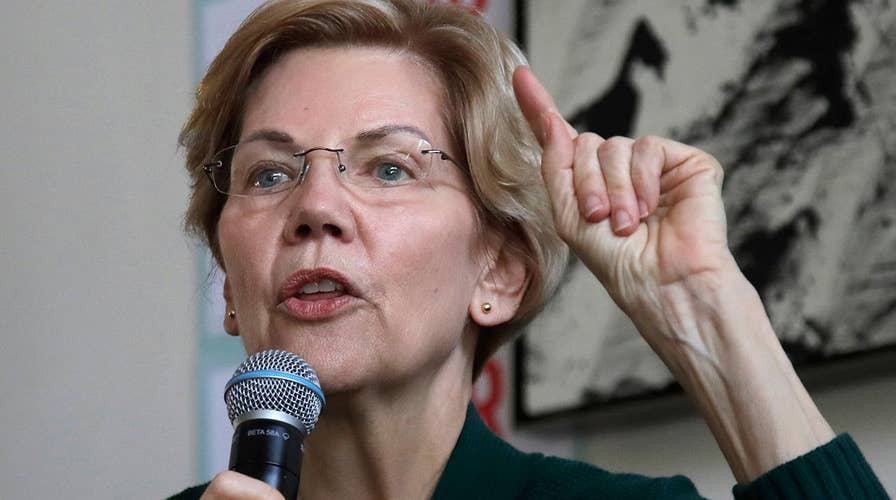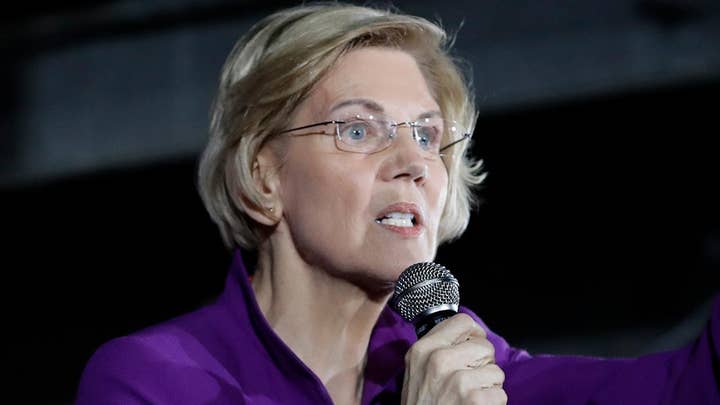Elizabeth Warren wants to change the Constitution, end the Electoral College
Democratic presidential candidate wants the popular vote to determine the presidency; Garrett Tenney reports from Washington.
It’s been less than three months since Sen. Elizabeth Warren, D-Mass., became the first Democratic presidential hopeful to enter the race, but it may as well have been three years. Look at how the political landscape has shifted since Warren’s surprise New Year’s Eve announcement.
As the field grows, each candidate is competing for two precious commodities: campaign dollars and news oxygen. Both are in short supply. Both are more valuable indicators of the health of a campaign than polls.
In the past, Warren could count on raising both in spades. Now, she’s losing in the battle for resources and attention, having been overshadowed by the three B’s of Biden, Bernie and Beto.
Consider that during Warren’s first day as a candidate, she raised $300,000 – or roughly 20 times less than the eye-popping $6 million hauls from Beto O’Rourke and Bernie Sanders. First quarter fundraising numbers won’t be public until mid-April, but Warren has already come up with a convenient excuse for her subpar total by swearing off big-dollar fundraisers.
On cutting through noisy news cycles, Warren has adopted a spaghetti approach: throw it against the wall and see what sticks. Packing the Supreme Court. Abolishing ICE. You name an extreme concept, chances are high Warren counts herself as a supporter. Already this week, Warren has called for eliminating the Electoral College and implementing reparations, and it’s only Wednesday.
These ideas would shred the Constitution and break the budget. But – incredibly – neither of those reasons are the main political impediments for Warren. No longer are extreme proposals separating issues like they might have been four years ago – during the election cycle that Warren should have run in as a candidate but didn't. These days, Warren has plenty of company and co-signers, and is not the trend-setting trailblazer.
As Warren’s campaign flounders, some have pointed to John McCain in 2008 as a path for her political redemption. The Arizona Republican began that election cycle as the frontrunner was written off halfway through and ended it as his party’s nominee.
There are key distinctions weakening the McCain and Warren comparisons. For one, McCain could always count on a deep reservoir of goodwill in New Hampshire and its first in the nation primary status. Affectionately known as the state’s third senator, McCain staked his fortune on the Granite State, and it worked.
Warren does not have that luxury, even though she represents neighboring Massachusetts, which shares a media market with vote-rich southern New Hampshire. Bernie Sanders won the New Hampshire primary four years ago with a monstrous 22-point margin and is again poised to be a powerhouse in the state. The Vermont socialist was atop a recent “Starting Five Power Ranking” from New Hampshire Journal, while Warren failed to crack the list.
Unlike McCain, Warren has not hunkered down and made New Hampshire a singular focus. She made her recent headlines about abolishing the electoral college in Mississippi, which is neither an early-voting nor competitive battleground.
One bright spot for Warren is the upcoming debates – assuming that she is able to meet the qualifying requirements. Having gone to college on a debate scholarship, Warren can be formidable dissecting her political opponents when the lights are shining brightest. Interestingly enough, one of the candidates she has shown the most disdain for is the one big name still waiting in the wings: Joe Biden.
CLICK HERE TO GET THE FOX NEWS APP
Biden and Warren have clashed before, most notably in 2005 over bankruptcy legislation backed by the former as a senator and opposed by the latter as a witness before his committee. In a Democratic field thus far marked with politeness and warmness toward each other, the bitterness between Biden and Warren stands out. She could be the ideal vehicle to highlight the many policy areas where Biden’s more moderate record diverges from today’s left-wing purity tests.
Had Elizabeth Warren entered the presidential race in 2016, she very well could be president. Now it seems as though her moment has come and gone. But it’s always a mistake to write her totally off. Either way, she still has a chance to leave her mark on the field.











































